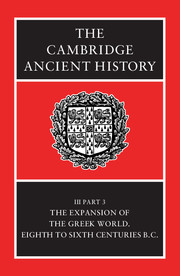Book contents
- Frontmatter
- Contents
- List of maps
- List of text-figures
- Preface
- 36a The Greeks in the Near East
- 36b The Greeks in Egypt
- 36c Cyprus
- 36d The Cypriot syllabary
- 37 The colonial expansion of Greece
- 38 The western Greeks
- 39a The eastern Greeks
- 39b Crete
- 39c Cretan Laws and Society
- 39d Euboea and the Islands
- 40 Illyris, Epirus and Macedonia
- 41 Central Greece and Thessaly
- 42 The Peloponnese
- 43 The growth of the Athenian state
- 44 The Tyranny of Pisistratus
- 45a Economic and social conditions in the Greek world
- 45b The material culture of Archaic Greece
- Chronological Table
- BIBLIOGRAPHY
- Index
- References
41 - Central Greece and Thessaly
Published online by Cambridge University Press: 28 March 2008
- Frontmatter
- Contents
- List of maps
- List of text-figures
- Preface
- 36a The Greeks in the Near East
- 36b The Greeks in Egypt
- 36c Cyprus
- 36d The Cypriot syllabary
- 37 The colonial expansion of Greece
- 38 The western Greeks
- 39a The eastern Greeks
- 39b Crete
- 39c Cretan Laws and Society
- 39d Euboea and the Islands
- 40 Illyris, Epirus and Macedonia
- 41 Central Greece and Thessaly
- 42 The Peloponnese
- 43 The growth of the Athenian state
- 44 The Tyranny of Pisistratus
- 45a Economic and social conditions in the Greek world
- 45b The material culture of Archaic Greece
- Chronological Table
- BIBLIOGRAPHY
- Index
- References
Summary
For the period before about 700 B.C. the chief tools of the historian of Central Greece must be the spade or the map, though a few strokes of ancient pens add a welcome touch of political definition to some events of the second half of the eighth century in stories of colonization and especially of the Lelantine War (CAH III.1, pp., 760–3, and here ch. 39d) which involved not only the cities of Euboea, but southern Thessaly, Megara, Delphi and other states besides.
More importantly, it was about the same time that Boeotia produced in the poet Hesiod our only contemporary literary evidence for the social and political atmosphere of Late Geometric Greece.
Hesiod
Hesiod's life spanned, roughly, the second half of the eighth century, spilling over, perhaps, into the seventh. His father, a trader of Aeolic Cyme, had turned his back on the dangers of the sea to settle on a farm at Ascra on the north-west slopes of Mt Helicon, a miserable village according to the poet, awful in winter and worse in summer, but not perhaps quite so bad as Hesiod's gloom would have us think – at least it was famed in antiquity for its beetroot (Ath. 4D). There Hesiod and his brother Perses were born and there, after their father's death, they fell to quarelling over the estate, a quarrel which prompted that hard picture of the farmer's year and stern sermon on justice, the Works and Days, this around 700 B.C. Somewhat earlier he composed his other surviving work, the Theogony, an account of the genealogies of the gods of Greece attached to the myth of the succession of Cronus to Uranus and of Zeus to Cronus as Lord of the Gods, the backbone of the poem. Of other works we have only fragments.
- Type
- Chapter
- Information
- The Cambridge Ancient History , pp. 286 - 320Publisher: Cambridge University PressPrint publication year: 1982
References
- 1
- Cited by

